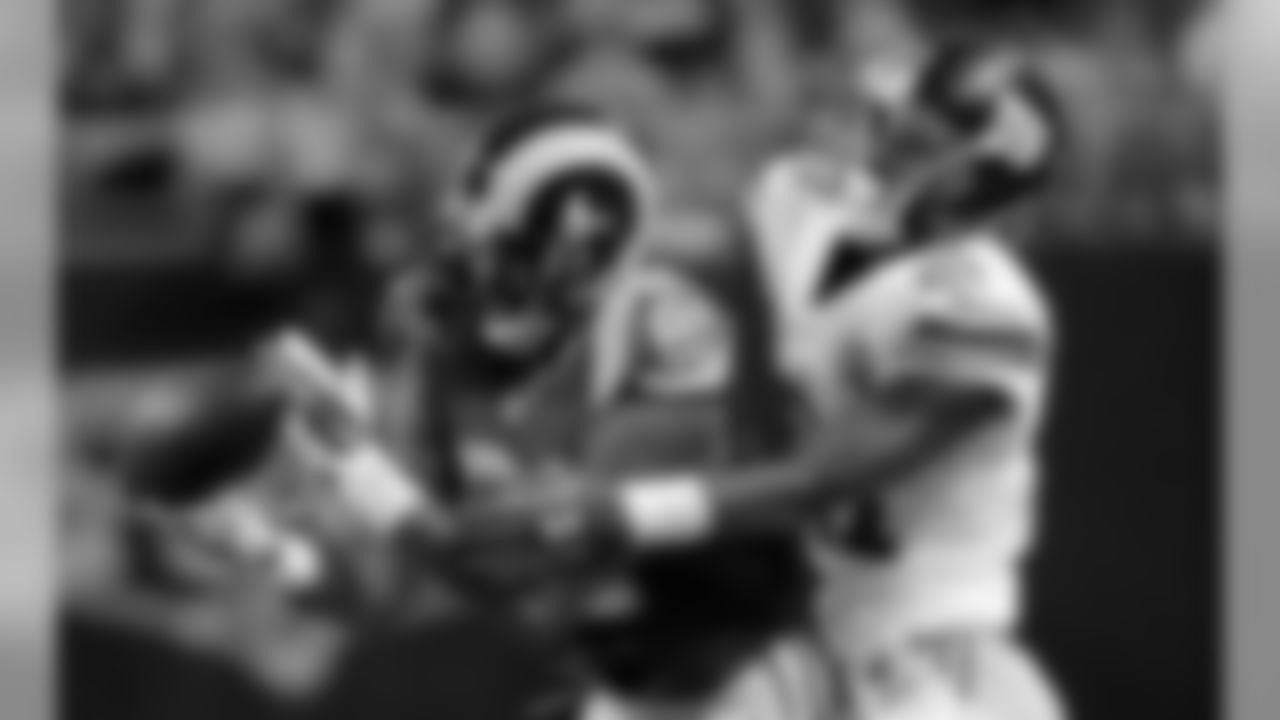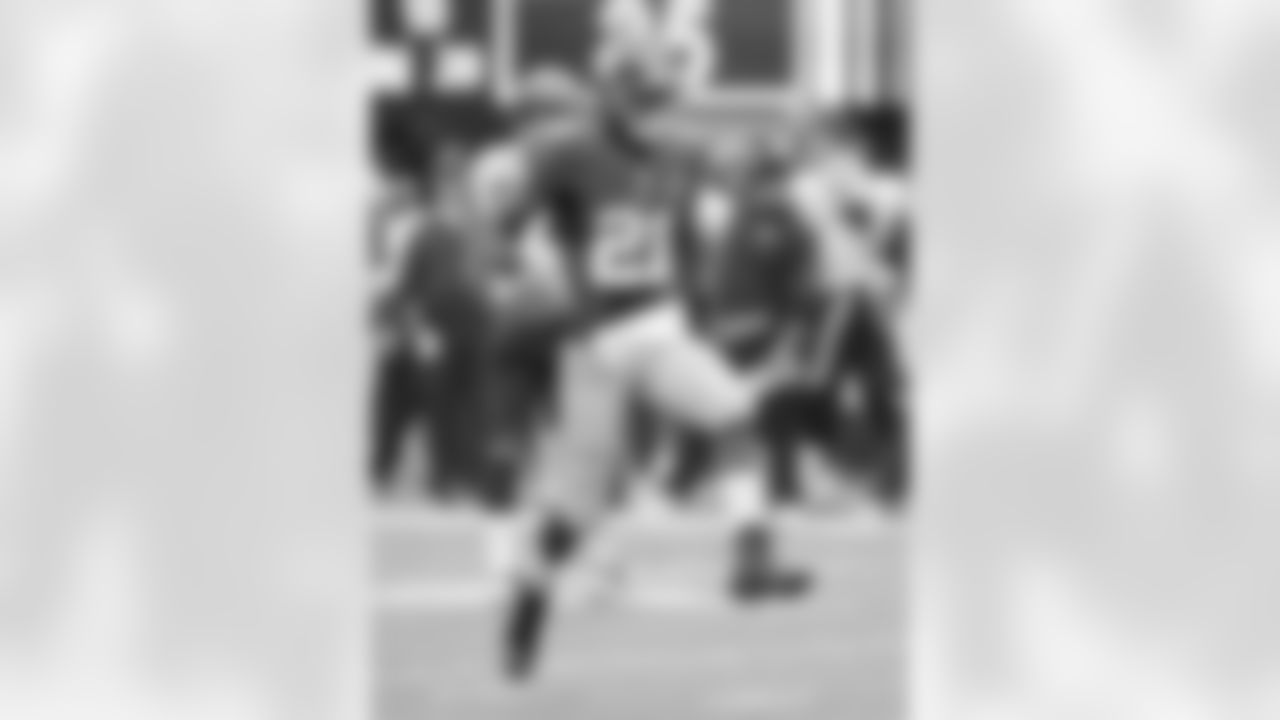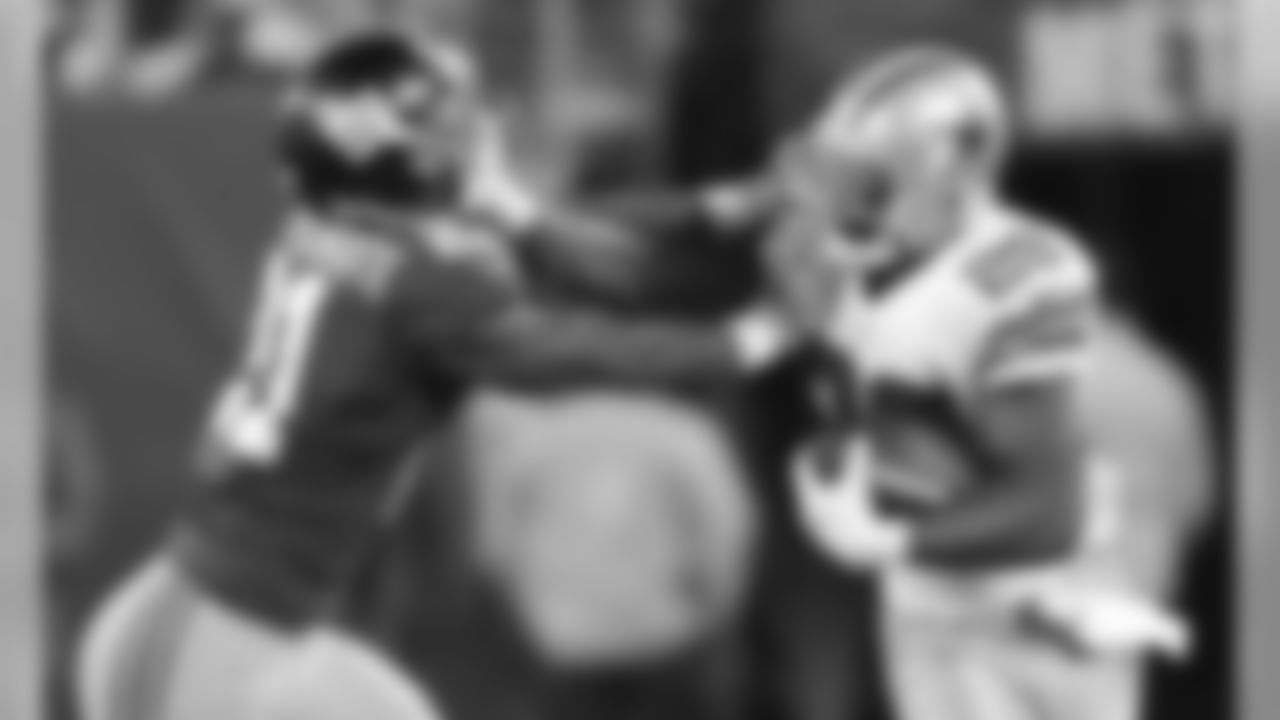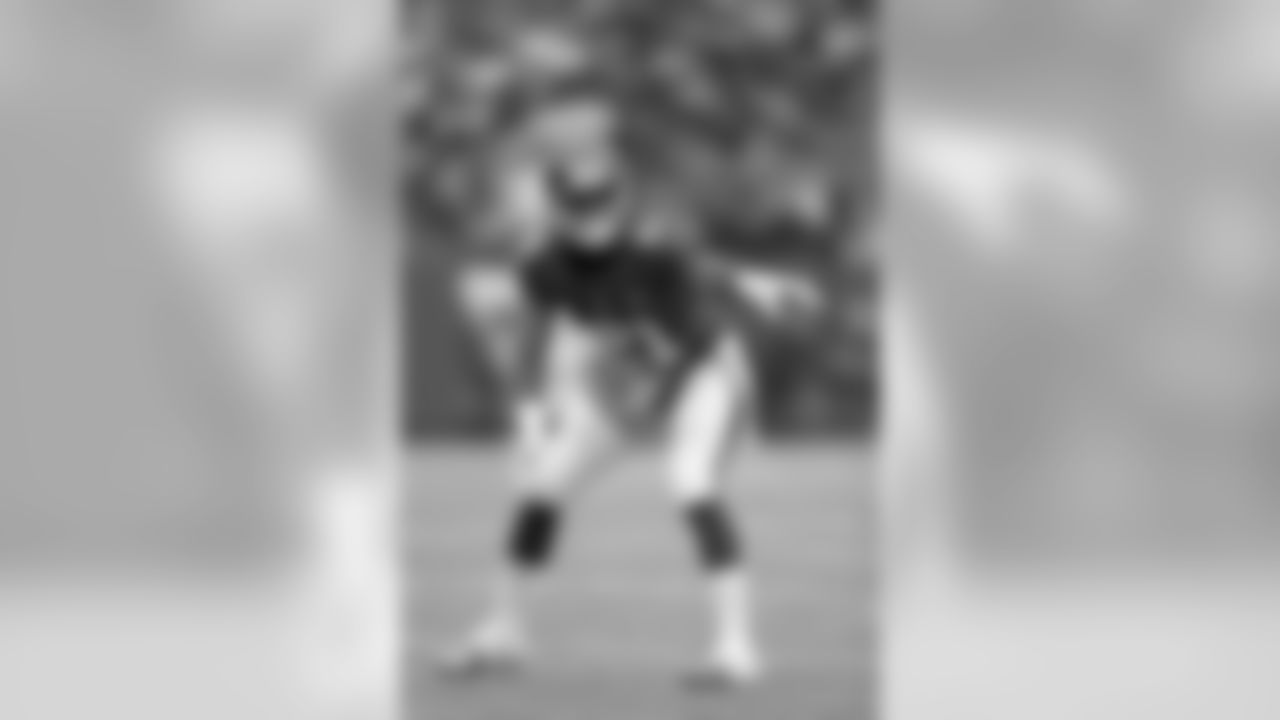When the Giants hosted the Dallas Cowboys on Nov. 23, Dominique Rodgers-Cromartie spent most of the evening covering Dez Bryant, the visitors' Pro Bowl wide receiver. Throughout most of the first half, DRC and Bryant sparred silently.
|
|||||||||||||||
Then the confrontation took a nasty turn. Shortly before halftime, Bryant caught a nine-yard pass and stepped out of bounds to stop the clock. Before returning to the huddle, the receiver turned to Rodgers-Cromartie, who also has a Pro Bowl on his resume, and poured gas on a flame that had been on low burn.
"He caught the first one, a little out route on the sideline and said, 'If there was time on the clock, 21, I think I would have run you over,'" Rodgers-Cromartie said. "You would have done what? Now you've got me woke, let's go. You're definitely going to get some talking out of him. He's always looks forward to competition like that."
So does Rodgers-Cromartie. For the remainder of the game, as DRC and Bryant traversed the field like a pair of synchronized ice skaters, they sparred both physically and verbally.
Off the field, DRC is soft-spoken, thoughtful and polite. His interviews are peppered with numerous "yes sir" and "no sir" responses. Rodgers-Cromartie would be very happy to perform his job in silence. But wide receivers throughout the NFL continue to challenge him. Once provoked, Rodgers-Cromartie is not going to keep his mouth shut.
"Here, everybody says I'm cool, calm and collected," DRC said recently. "I'm like that at the start of the game. But my pet peeve is, and everybody around me knows, if receivers, catch a ball on me and celebrate, you're going to have a long game from here on out. I do not like that. You already caught a pass on me, that's good enough. Don't go doing your antics. Now you've made me a talker, you're going to make me quick jab you, try to hit you after the play. All kinds of stuff. I go in just playing the game because that's how I am. I'm naturally calm and I just play. But if you say one word then you're started some fire."
It's that competitive burn that has enabled Rodgers-Cromartie to enjoy success throughout his life. It also kept him determined in a career that included stops at four high schools, low-profile Tennessee State University, four NFL teams and losses in two Super Bowls, including the one played in MetLife Stadium early this year.
"It's time to stay in one place," said Rodgers-Cromartie, a seven-year veteran. "I've got to learn new systems every year, I've got to change my style of play. I'm just trying to get somewhere and finish out my career. I'm not young anymore, I'm getting old, man (he's 28). It's just trying to settle down somewhere. "
DRC was raised in Bradenton, Florida. His dad, Stanley Cromartie, was a basketball coach who traveled so often Rodgers-Cromartie said, "I grew up with just my mom." She held two jobs as a nurse's assistant, so DRC was a major influence in the lives of his two younger sisters.
"Begin the oldest, being a protector they always look to me first," he said. "I was the example setter, one of the first boys to go to college out of the family. I set an example for my sisters. They are about to graduate from college, so I feel like I did a good job."
Rodgers-Cromartie's athletic career was almost derailed before it began. He was born with a non-functioning kidney. When it was removed when he was five years old, it was thought he would never play contact sports. But the ban ended almost as soon as soon as it began. He wore a pad for a while to protect the kidney, but eventually discarded it.
"There's still that chance of being hurt pretty bad, but I don't tend to think about that," DRC said. "I just go and play."
The missing kidney did influence the position he played.
Check out photos of CB Dominique Rodgers-Cromartie from the 2014 season









"That's why I play defense," he said. "I get to do the hitting. I can't let anybody hit me. I used to watch football and watch some of the devastating hits and say, 'Uh.' But it grew on me, just staying around it. It kept me out of trouble, so it stayed with me."
But it took a while for him to get a foothold in the game. Rodgers-Cromartie was a nomad for most of his high school years and didn't get to play until he was a senior at Lakewood Ranch High School in Bradenton.
"I was a late bloomer," DRC said. "I was always on the team, but I never got in the game. I went to four different schools. My ninth grade year, I moved with my father to Orlando. I was small; I was like 5-3 and all through high school and I kept getting shipped around in Orlando, because he kept getting different jobs (the most prominent of which was as an assistant coach at Bethune-Cookman). I had a six-inch growth spurt my junior year. Finally, my senior year I went back home and then that's when I was able to get on the field."
Once there, he was immediately one of the region's best players.
Rodgers-Cromartie was an All-Area, All-Class 5A and All-District defensive back and wide receiver and was named the most underrated prospect in Florida by the High School Recruiting Report. He also excelled on the track team as a sprinter, long jumper, high jumper and triple jumper.
"I was finally getting to play, making plays and having a lot of people come into your school and want to talk to you," DRC said. "I was on a 5-5 team, but I got a chance to play in the All-Star game down there. That really helped me out and got me a couple looks. But I didn't have (SAT or ACT) scores coming out, so a lot of people fell off me. That's why I went the route that I went."
That route took him not to a major football power but to Tennessee State University in Nashville, where his uncle, Rod Reed, was the defensive coordinator (and is now the head coach).
"I had a good GPA, but my scores weren't good enough to get a full ride," Rodgers-Cromartie said. "So my uncle said, 'You can come play corner for me, but you're going to have to work your way in. If you work your way from there, I'll give you a full ride.' I didn't think twice. I signed the first chance I could."
DRC made his mark immediately – both bad and good.
"I got up there early," he said. "That first day of one-on-ones I think I picked off every pass. It got to a point during my freshman season that the coaches would count in practice how many picks I would get against our number one team. I was the only true freshman on the team coming in, but I didn't play. I was like the fourth corner. In the first game two of the starting corners went down, so I got thrown out there and that's how I broke my redshirt. That second game was against Jackson State. The first play I was against Cleatis Gordon, who used to play for the Chargers, He took me 60 yards. I remember coming to the sideline and they were like, 'I told you coach, he's a freshman, he's not ready. We can't throw him out there.' And it was 7-7 going into the fourth quarter and they were on a game-winning drive when they ran a hitch my way and I picked it off for a pick six.
"That first play that ball went over my head. But I battled, stayed in the whole game, and got the game-winning pick six. I never looked back."
Because he was victimized on a long touchdown pass and scored the game-winner on a pick, Rodgers-Cromartie learned a valuable lesson in his collegiate debut about playing cornerback.
"You've got to have a short memory," he said. "Also, you've got to be focused at all times, because you never know when it's going to come your way."
The game also solidified his desire to play cornerback.
"I liked the competition," he said. "It's me and you, man, mano e mano. When something happens you know it's because he beat you. It gives you a certain rush. That's why I love corner, because you get to be competitive."
Fueled by his recharged desire, DRC became not only one of the best players in the history of Tennessee State, but in the Ohio Valley Conference. He was a two-time All-America and a three-time All-OVC first-team selection. Rodgers-Cromartie finished his career with 11 career interceptions, including four he returned for touchdowns. He also brought back a fumble and a kickoff for touchdowns, and blocked eight kicks during his collegiate career. DRC totaled 859 yards on 36 kickoff returns (23.9-yard avg.).
Rodgers-Cromartie believed he had NFL talent, but was concerned his small-school background would deny him a chance to make a team. Then he got a big break.
"A lot of corners dropped out of the Senior Bowl," he said. "They were trying to fill in spots and they gave me an opportunity. Once I went to the Senior Bowl and matched up with the big guys there, that's when I thought, 'I can play in this game.' I was going hard, but they had me playing safety at the Senior Bowl. Then in the game they moved me to corner and I ended up getting defensive MVP."
After proving he could excel playing against some of the nation's best wide receivers, DRC was the 16th overall selection of the 2008 NFL Draft by the Arizona Cardinals. In his first pro training camp, Rodgers-Cromartie knew little about technique and the nuances of his position. He simply played with his instinct and athletic ability.
But one of his fellow defensive backs began teaching him the finer points of the game. Antrel Rolle had been the Cardinals' top draft choice in 2005. After three seasons at corner, he moved to safety that year. And Rolle was eager to impart his wisdom to the team's skilled new cornerback.
"I always say he's one of the most freakish guys I've ever seen on the turf," Rolle said. "He can jump, run, he can lock down any receiver. He has long arms and more importantly, he's a playmaker.
"It was definitely a work in progress, but we had great chemistry from the start. He has athleticism and ability out of this world. I just tried to teach him little fundamentals, the ins and outs of a defense, how to play certain kinds of coverages, how to play certain kinds of leverages and just let his ability take over. There were a lot of times on film where I saw certain things and I would tell him, 'Look, DRC, go get it. This is coming.' Every time I told him that he trusted me enough and he actually let it hang out and went it got it and made a couple pick sixes off those plays."
Rodgers-Cromartie said the mentoring he received from Rolle and others helped him mold him into an outstanding professional player.
"When I came in, I was a high-wire guy," he said. "They slowed me down, they worked on my mechanics, because I wasn't a technique guy. I was just fast and wanted to go play. He broke that down to me and taught me the game, what a three-step was and things of that nature."
The improvement wasn't immediate, and Rodgers-Cromartie had some rough experiences on his trip around the learning curve.
"Those first few games were tough, man," he said. "I think I gave up about five scores in the first few games (the list of receivers who beat him included Steve Smith, Torry Holt and Miles Austin). I was on Sportscenter's Top 10, but not the good one. They were going over the top of my head. I was making plays, but I was so fast out of my breaks, they were moving me and I didn't know how to read them, I didn't know anything. I was just playing full speed.
"It made me question myself one time where I said, 'Am I good enough to play?' But then in practice I'd go against guys like Larry Fitzgerald and Anquan Boldin and be right on them. I'm like, 'Something isn't right.' So I had to re-study myself – 'If I can guard these guys I know I can guard other people.' And then it just clicked for me. I'm a confident guy. It's hard to play corner, because one false move and it's a touchdown. I just kept lining up and at one point I thought, 'I can't be this bad. Something isn't right.' I talked to Trel and asked him, 'I know I can play, what am I doing wrong?' One thing about Trel, is he's a big film watcher. He broke down that film and said, 'I think you can do this, this and that.' I just listened and the game went to another level."
So did the Cardinals, who that season advanced to their first – and still only – Super Bowl, which was played in Tampa, near DRC's hometown. They took a lead with just 2:27 remaining, when Fitzgerald caught a 64-yard touchdown pass. But Arizona suffered a heartbreaking defeat when Pittsburgh's Ben Roethlisberger threw a six-yard touchdown pass to Santonio Holmes with just 35 seconds remaining. Aaron Francisco, Rolle and DRC were all close to the receiver, but couldn't prevent him from catching the ball.
"That hurt for a long time," Rodgers-Cromartie said. "To this day, I can't watch replays of the game, because I knew we were that close. What hurts the most is the play before that they ran the same play to the other side, but they missed it. Trel was saying, 'You have to stay back.' They did the same thing and I jumped it again trying to make a play and they threw it right over my head."
The following year, DRC started all 16 games, had a career-high six interceptions and he and Rolle each played in their first Pro Bowl. Rodgers-Cromartie played well again the following year. But as training camp opened in 2011, he was traded, along with a second-round draft choice, to Philadelphia for quarterback Kevin Kolb.
"It was very shocking," he said.
After two seasons in Philadelphia he moved again, to Denver, where he helped the Broncos advance to his second Super Bowl, played last February in MetLife. But this one wasn't close as Denver was blasted by the Seattle Seahawks, 43-8.
"The last-second loss hurts even more," he said. "I'd rather get blown out."
Rodgers-Cromartie was a free agent after the season and on March 17 he became one of the Giants' most significant free agent acquisitions.
"You get a chance to be reunited with the guy that helped your career in Antrel Rolle," DRC said. "I knew they had Prince (Amukamara) on the other side. You've got good pieces. Then you bring in Walter Thurmond, I'm like, 'Shoot, this could be scary over here.' You know the division, you know the Giants as an organization are used to winning. They won two Super Bowls, so I'm out here thinking, 'I've got an opportunity to play for a Super Bowl.'"
But in a cruel double jeopardy, injuries have ruined DRC's noble plans. First, Amukamara, Thurmond and Trumaine McBride are all on injured reserve, gutting the secondary Rodgers-Cromartie envisioned he would play in. And his own ailments – hamstring, back, side, shoulder – have curtailed both his playing time and his effectiveness.
"You lose Walter Thurmond, you lose Trumaine McBride then you lose Prince, all three of those guys, they're the core of our secondary," DRC said. "We all were playing well, real good. When you have everybody playing well on the core it helps everybody out. You've got all your pieces out there, but you have to just keep grinding. Look at Zack Bowman, he stepped up and he's been playing real good for us. You would like to have everybody out there, but it hasn't been like that."
Although Rodgers-Cromartie has played in every game, he's often removed himself to give his body a brief respite. He returns as soon as possible to tangle with Bryant and the other tremendous receivers the Giants face, but he's not as healthy as he'd like to be. The injuries have forced DRC to spend hours in the trainer's room. But he is philosophical and optimistic and about his predicament.
"Any time you get an opportunity to play you just go out there and play," Rodgers-Cromartie said. "In football, things don't always go your way. You've just got to keep fighting."
The Giants appreciate that he has, but they know they've yet to see the best of DRC.
"I was so excited in the preseason and I was so excited during camp and so excited at the beginning but, quite frankly, you haven't seen, because of the restrictions that he's had and the physical restrictions that have been placed on him due to injury, you really haven't," coach Tom Coughlin said. "He tries to go, give the guy credit. He wants to play, but for one thing or another, he gets in the game and then he ends up (missing some plays)."
But it's going to take a lot more than some aches and pains to put DRC on the inactive list.
"It's frustrating, because at the end of the day you want to be out there on the field playing, especially when your team is down and out and they're fighting," he said. "I'm the type of guy, I need to fight with you. That's where I come and give what I can give you. Injuries are definitely there but I'm not thinking about it. I just go out there and try to battle."
As Dez Bryant and numerous other receivers have learned, he's not going to stop.






